View in other NatureServe Network Field Guides
NatureServe
Montana
Utah
Wyoming
Idaho
Wisconsin
British Columbia
South Carolina
Yukon
California
New York
Gardner's Saltbush - Atriplex gardneri
Other Names:
Atriplex aptera, Atriplex falcata, Atriplex nuttallii [misapplied]
Native Species
Global Rank:
G5
State Rank:
S5
C-value:
3
Agency Status
USFWS:
USFS:
BLM:
External Links
General Description
PLANTS: Low, mostly dioecious subshrubs to 50 cm high. Stems prostrate to usually decumbent with gray-scurfy foliage. Source: Lesica et al. 2012
LEAVES: Short-petiolate; the blades linear to spatulate, 5–40 mm long with entire margins, the lowest sometimes opposite. Source: Lesica et al. 2012
INFLORESCENCE: Glomerules in terminal spikes or dense panicles. Male flowers yellow or brown, 5-parted. Female flowers lacking a calyx; pistillate bracts united above the middle. Mature pistillate bracts lanceolate to orbicular, 2–5 mm long with toothed or winged margins and facial tubercles. Source: Lesica et al. 2012
Montana has 3 varieties: gardneri, aptera, falcata
Diagnostic Characteristics
In Montana, three varieties of Atriplex gardneri have been reported (Welsh in FNA 2003); however, their morphological characteristics do not often differ ecologically and many herbarium specimens cannot be assigned with confidence to a variety (Lesica et al. 2012). The MTNHP is not tracking these varieties; however, observation data submitted to MTNHP will retain within the botany database the varietal name if provided by the observer.
Variety gardneri: globose to flattened pistillate scales with lateral teeth and facial tubercles.
Variety aptera: ellipsoid pistillate scales with 4-lobed lateral wings. It is considered to be a hybrid between Atriplex gardneri and Atriplex canescens (Welsh in FNA 2003). Variety aptera is frequently found, long-lived, and fertile.
Variety falcata: lanceolate pistillate scales without lateral teeth and may have or may not have low facial tubercles.
Species Range
Montana Range
Range Descriptions
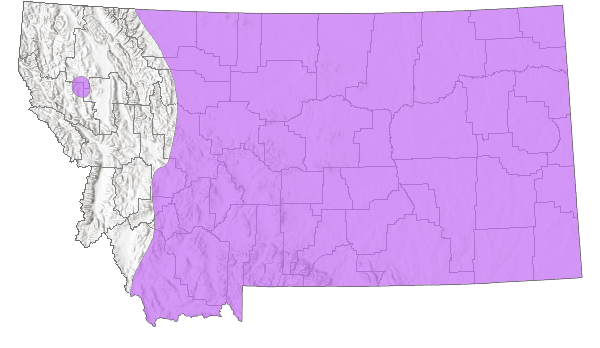
 Native
Native
Range Comments
Occuring throughout most of MT; AB to MB south through e WA to CA, AZ, NM and east to the Dakotas and NE (Lesica et al. 2012. Manual of Montana Vascular Plants. BRIT Press. Fort Worth, TX; Welsh 2003 in Fl. N. Amer. Vol. 4).
Observations in Montana Natural Heritage Program Database
Number of Observations: 1021
(Click on the following maps and charts to see full sized version)
Map Help and Descriptions
Relative Density
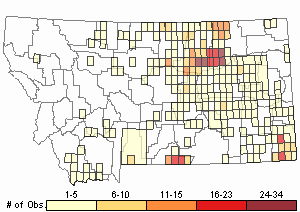
Recency
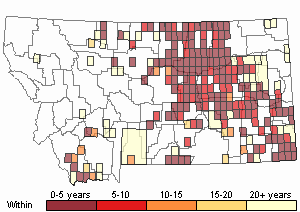

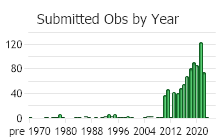
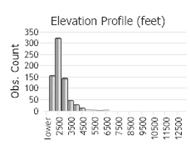 (Observations spanning multiple months or years are excluded from time charts)
(Observations spanning multiple months or years are excluded from time charts)
Habitat
Fine-textured, saline soils of stream terraces, badlands, steppe, grasslands; plains, valleys, montane (
Lesica et al. 2012. Manual of Montana Vascular Plants. BRIT Press. Fort Worth, TX).
Stewardship Responsibility
References
- Literature Cited AboveLegend:
 View Online Publication
View Online Publication Lesica, P., M.T. Lavin, and P.F. Stickney. 2012. Manual of Montana Vascular Plants. Fort Worth, TX: BRIT Press. viii + 771 p.
Lesica, P., M.T. Lavin, and P.F. Stickney. 2012. Manual of Montana Vascular Plants. Fort Worth, TX: BRIT Press. viii + 771 p.
- Additional ReferencesLegend:
 View Online Publication
View Online Publication
Do you know of a citation we're missing? Harvey, S.J. 1990. Responses of steppe plants to gradients of water soil texture and disturbance in Montana, U.S.A. Ph.D. Thesis. Bozeman, MT: Montana State University. 34 p.
Harvey, S.J. 1990. Responses of steppe plants to gradients of water soil texture and disturbance in Montana, U.S.A. Ph.D. Thesis. Bozeman, MT: Montana State University. 34 p. Lesica, P., M.T. Lavin, and P.F. Stickney. 2022. Manual of Montana Vascular Plants, Second Edition. Fort Worth, TX: BRIT Press. viii + 779 p.
Lesica, P., M.T. Lavin, and P.F. Stickney. 2022. Manual of Montana Vascular Plants, Second Edition. Fort Worth, TX: BRIT Press. viii + 779 p. Meier, G.A. 1997. The colonization of Montana roadsides by native and exotic plants. M.Sc. Thesis. Bozeman, MT: Montana State University. 45 p.
Meier, G.A. 1997. The colonization of Montana roadsides by native and exotic plants. M.Sc. Thesis. Bozeman, MT: Montana State University. 45 p. Quire, R.L. 2013. The sagebrush steppe of Montana and southeastern Idaho shows evidence of high native plant diversity, stability, and resistance to the detrimental effects of nonnative plant species. M.Sc. Thesis. Bozeman, MT: Montana State University. 124 p.
Quire, R.L. 2013. The sagebrush steppe of Montana and southeastern Idaho shows evidence of high native plant diversity, stability, and resistance to the detrimental effects of nonnative plant species. M.Sc. Thesis. Bozeman, MT: Montana State University. 124 p. Skinner, K.F. 1995. Plant and grasshopper community composition: indicators & interactions across three spatial scales. M.Sc. Thesis. Bozeman, MT: Montana State University. 144 p.
Skinner, K.F. 1995. Plant and grasshopper community composition: indicators & interactions across three spatial scales. M.Sc. Thesis. Bozeman, MT: Montana State University. 144 p.
- Web Search Engines for Articles on "Gardner's Saltbush"





